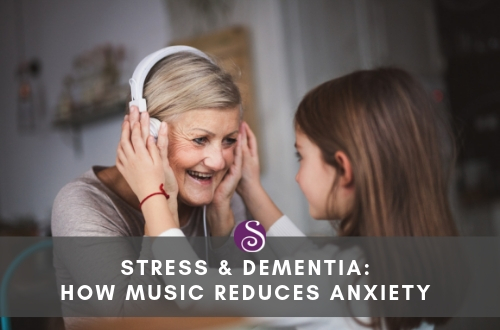 When it comes to relaxing and reducing stress, music is one of the most powerful tools available. A major key to reducing anxiety, particularly in someone with a dementia like Alzheimer’s, is redirecting their attention away from stressful triggers.
When it comes to relaxing and reducing stress, music is one of the most powerful tools available. A major key to reducing anxiety, particularly in someone with a dementia like Alzheimer’s, is redirecting their attention away from stressful triggers.
Music can transport our minds, evoke memories and literally block out distractions in the world around us. This can be helpful for anyone looking to manage stress, but especially in a loved one living with dementia.
How music can physiologically affect your body
The ability for music to reduce stress isn’t just psychological. Some studies have shown that listening to music can lower:
- Pulse
- Heart rate
- Blood pressure
- Cortisol (stress hormone) levels
In people with dementia, music can serve as a distraction, allowing them to tune out triggers and be more comfortable in their surroundings.
What type of music reduces stress and anxiety?
If you care for someone with dementia or Alzheimer’s, the best music to get them to relax is something slow and quiet. Classical music is great for this, but not everyone is a classical music fan — or if they are, that doesn’t necessarily mean they want to listen to it all the time. Slow ballads and soft acoustic tunes may be great options as well.
In terms of reducing stress in general, the best music is:
- Enjoyable
- Familiar
- Calming
And that can vary from person to person. According to the experts at Serenades by Sonata, a specialized memory care community in Florida, the default idea of playing music from the 1940s and 1950s is becoming outdated.
“Many of our residents are now in their 60s and 70s and grew up in a different generation. They enjoy music from artists like Led Zeppelin, Madonna, Jimmy Buffett and Pearl Jam,” said Julie Fernandez, certified dementia care expert at Sonata Senior Living. “It’s all about catering to the individual and what they’ve always enjoyed. They didn’t become a different person just because they were diagnosed with dementia.”
Sometimes the best option isn’t even music at all. Recorded nature sounds such as rainforest noises, birds chirping or a babbling creek can be a relaxing way to unwind and manage anxious episodes.
Best practices for incorporating music into dementia caregiving
Easy Access
Encouraging independence is key when it comes to caring for someone with a dementia like Alzheimer’s — that includes everything from mealtime to music listening.
Create an environment where your loved one has easy access to on-demand music to manage their stress.
At Serenades by Sonata, soft music is always playing in the background and residents have access to SIMPL™Music Players. These special devices, created especially for those with dementia and Alzheimer’s, are easy to operate: you simply lift the lid to begin playing music. There are no knobs to turn or tiny buttons to adjust, and it comes preloaded with music or you can add your own MP3 files.
Headphones
In addition to music playing through speakers, personal headphones are a great option for managing stressful situations in those with dementia since they can block out triggers and “cancel” ambient noise.
Over-the-ear headphones are recommended, as opposed to ear buds, since they tend to be more comfortable and better isolate noise. Plus, wireless headphones eliminate the temptation for your loved one to tangle and unplug cords that may get in the way.
Music Volume
Use common sense when adjusting music volume for someone with dementia. Background music intended to relax should be soft and calming, not overwhelming. Look for any behaviors from your loved one that may indicate they find the music too loud, and take note of the ideal volume setting for them.
Regardless of the setting, music is a powerful tool for managing stress in both people with dementia and their caregivers. Take advantage of its benefits!
For more information on Sonata’s senior living communities, call a community near you today to schedule a visit →
Related Articles
JTVCcnB3ZSUyMGNzc0lEJTNEJTIycmVsX3BvJTIyJTIwb3JkZXJieSUzRCUyMnJlbGV2YW5jZSUyMiUyMHRodW1iX2hlaWdodCUzRCUyMjE2MCUyMiUyMHRodW1iX3dpZHRoJTNEJTIyMjEwJTIyJTIwdGh1bWJfYWxpZ24lM0QlMjJycHdlLWFsaWduY2VudGVyJTIyJTIwZXhjZXJwdCUzRCUyMnRydWUlMjIlMjBsaW1pdCUzRCUyMjQlMjIlMjB0aHVtYiUzRCUyMnRydWUlMjIlNUQ=
